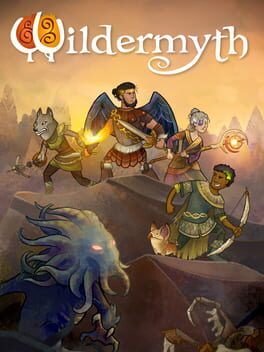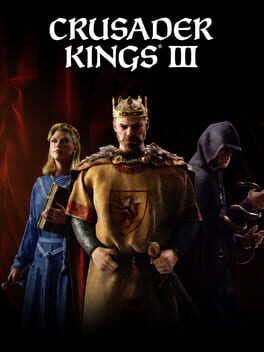shaymin_shaman
130
Total Games Played
000
Played in 2024
016
Games Backloggd
Recently Reviewed See More
A game that seems amazing... For exactly one playthrough. Wildermyth is entirely predicated on the idea of your group of randoms developing into unique heroes over the course of a campaign, basically emergent storytelling but mechanically enforced rather than headcanon-based. The problem is that this promise does not match up with the game's mechanics.
First and foremost, combat is not particularly interesting, with few classes and options within combat that are pretty clearly better than others. Now, this would be excusable if the emergent storytelling aspect had meaningful implications for gameplay. It doesn't. One character could have their arm replaced with a spray of fire, permanently. What does this give them? A melee attack that almost certainly does less damage than your other options. You might say, who cares if these aspects integrate into combat, most people don't play TTRPGS solely for the combat gameplay, anyway. The problem is that, for most character variances, combat is the sole place where they have any bearing, outside of appearance, since future events very rarely reference changes that your characters have endured, unless they're explicitly seeded by main story events. What this means is that your ultra-badass 70-year old character ultimately boils down to being "strong mage #2" rather than someone with unique strengths, weaknesses, or utilities. This issue is only made worse by the fact that the game is designed for multiple playthroughs, and even by your second, you'll likely be seeing multiple duplicate events in every run past the first. This would be fine for events like "Party gets stuck in a storm," or something, but in most runs you'll have the option to have some member of your group transform his arm into stone or her head into that of a wolf, things that should be memorable, but become stock standard after 2-3 campaigns. I wouldn't be harping on this fact if the game didn't explicitly want you to play more than one campaign. As a final note, while I understand the need for artistic simplicity in making these procedurally-generated characters, the player characters in Wildermyth look really bad. The creatures, backgrounds, and overworld generally look fine though.
Wildermyth ultimately feels like it takes a lot of the worst elements of procedurally-generated games and puts them front and center, hoping that you'll be charmed enough by the stories you invent for your characters to excuse the lack of legwork the game itself does in making said characters feel interesting or unique.
First and foremost, combat is not particularly interesting, with few classes and options within combat that are pretty clearly better than others. Now, this would be excusable if the emergent storytelling aspect had meaningful implications for gameplay. It doesn't. One character could have their arm replaced with a spray of fire, permanently. What does this give them? A melee attack that almost certainly does less damage than your other options. You might say, who cares if these aspects integrate into combat, most people don't play TTRPGS solely for the combat gameplay, anyway. The problem is that, for most character variances, combat is the sole place where they have any bearing, outside of appearance, since future events very rarely reference changes that your characters have endured, unless they're explicitly seeded by main story events. What this means is that your ultra-badass 70-year old character ultimately boils down to being "strong mage #2" rather than someone with unique strengths, weaknesses, or utilities. This issue is only made worse by the fact that the game is designed for multiple playthroughs, and even by your second, you'll likely be seeing multiple duplicate events in every run past the first. This would be fine for events like "Party gets stuck in a storm," or something, but in most runs you'll have the option to have some member of your group transform his arm into stone or her head into that of a wolf, things that should be memorable, but become stock standard after 2-3 campaigns. I wouldn't be harping on this fact if the game didn't explicitly want you to play more than one campaign. As a final note, while I understand the need for artistic simplicity in making these procedurally-generated characters, the player characters in Wildermyth look really bad. The creatures, backgrounds, and overworld generally look fine though.
Wildermyth ultimately feels like it takes a lot of the worst elements of procedurally-generated games and puts them front and center, hoping that you'll be charmed enough by the stories you invent for your characters to excuse the lack of legwork the game itself does in making said characters feel interesting or unique.
Ultimately, Crusader Kings III is a downgrade over its predecessor even if it adds some appreciated individual improvements (cadet branches, dynamic cultures/religions, etc.). In my opinion, the game's fatal flaw is that it's simply too easy. Once you get over the initial hurdle of learning the mechanics, it becomes almost laughably easy to create lineages of godlike characters who live into their 80s, most of the time without even trying or "minmaxing." Similarly, wealth is far too easy to accrue and expansion is similarly easy, meaning that even a moderately skilled player can restore Roman borders within 2-4 generations. A common point made by fans of CK2 is that it took somewhere between 2-5 years of expansions/updates to become truly "great," but considering both the pace at which Paradox is releasing updates, as well as the fact that most of these updates so far have focused on "flavorful" additions, such as tournaments and relationships (which ultimately end up becoming little more than further sources of character boosts/money), I do not have high hopes for the future of this game. However, I will say that this game is much more accessible for newcomers, and can offer a few fun campaigns until you see its relatively shallow depth.


